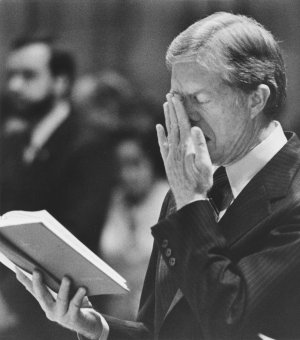[Advertisement plays]
Jim Lounsbury: The sudden rush of young Muslim militants through the gates of the United States Embassy in Tehran on November 4th and the taking of 63 American hostages touched off the most serious foreign-policy confrontation for the United States in a decade.
UPI reporter Edmond Smith reports from Tehran.
Edmond Smith: "The staff of the U.S. Embassy in Tehran knew that a big anti-American demonstration had been planned for the morning of Sunday, November the 4th; but they were still caught unawares when something like 400 Muslim militants suddenly rushed through the Embassy gates and over the 10-feet-high brick wall. Marine guards fought back with teargas, but they were ordered not to open fire because the attackers were unarmed, and within a couple of hours all the Americans within the compound and a number of staff and visitors from other nations had been taken captive, and the militants promptly announced that they would be held hostage until the Shah was handed back to Iran to face trial.
"The Shah's admission to a New York hospital several weeks before had deeply offended many in Iran, who considered him a criminal and a murderer. Iran's religious strongman, Ayatollah Khomeini, promptly made it clear he supported the young militants, and he began a campaign of increasing violence that had been a rhetoric against America and President Carter.
"Meanwhile, those first days of captivity were terrifying ones for the hostages. They were kept blindfolded and bound most of the time, isolated in small groups and interrogated repeatedly by their captors about their own role within the Embassy and the actions of the American Government.
"Then, 13 days after their capture, Khomeini announced the first and only confession he was to make: ordering the Muslims to release 13 women and blacks from among their captives. At the same time, they had been gradually turning loose all the non-Americans until only 48 men and 2 women remained captive.
"But then the crisis deepened with a series of threats from the militants that they would immediately kill all their captives if there was any attempt to rescue them, and that in any case they would be tried as spies before Iran's Revolutionary Court, using as evidence documents which the militants captured at the Embassy and later released copies of, which they said proved that some of their hostages were CIA agents.
"While they were waiting in grim isolation, Idaho Republican Congressman George Hansen arrived in Tehran, and after he convinced the militants he was not a representative of the American Government, but had come on his own, he was able to see the hostages and to describe the conditions under which they were being held."
Congressman George Hansen: "Basically, I think almost all of them, I don't know if I remember any of them that did not have the conventional kind of loose -- loose cloth wrappings around their arms. And so basically that was about the only restriction, except the fact that...well, I guess some of them were barefoot; but I don't remember whether I saw whether every person was barefoot."
Edmond Smith: "Meanwhile the head of Iran's national radio and television...had suggested that an international commission be formed before the trials were held; and when he subsequently took over as Foreign Minister, he was able to explain that what would be on trial before the commission would not be the hostages, but American Presidents as back as President Truman and America's foreign policy in supporting the Shah."
Unknown Speaker: "To put on the trial, actually, the politics of intervening in our affairs by the United States for past three, four, five years. Therefore, this is the distorted history of our country by United States; it is the ponderness (sic) of our country by the United States; and it is the tortures and killings that happen in this country by the United States Government which are going to be on the trial."
Edmond Smith: "And outside the gates of the Embassy, meanwhile, the crowds gathered each day to show their hatred of President Carter and their demand that America hand the Shah back. Edmond Smith, Tehran."











